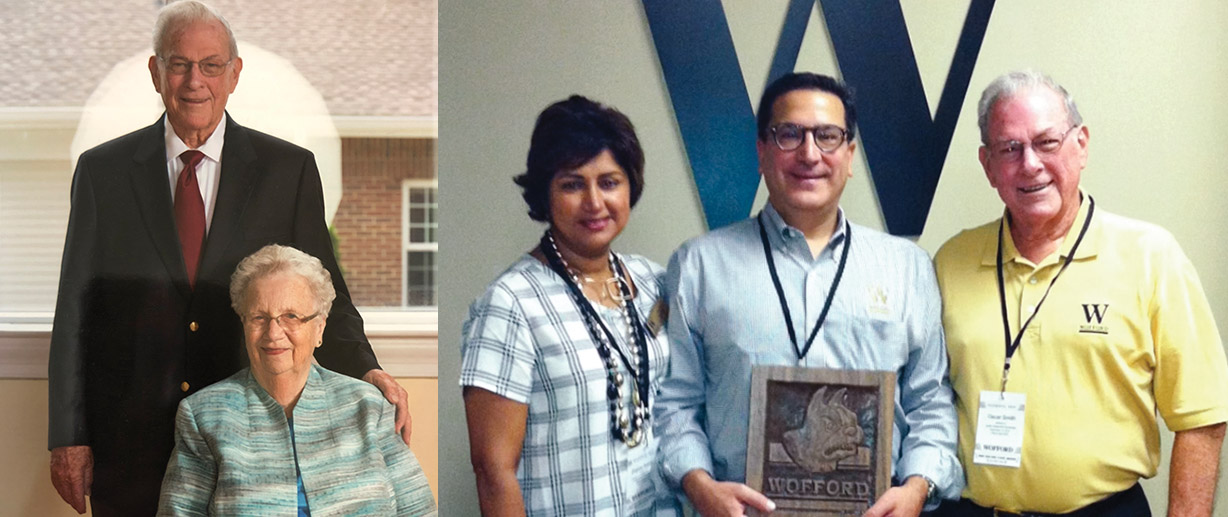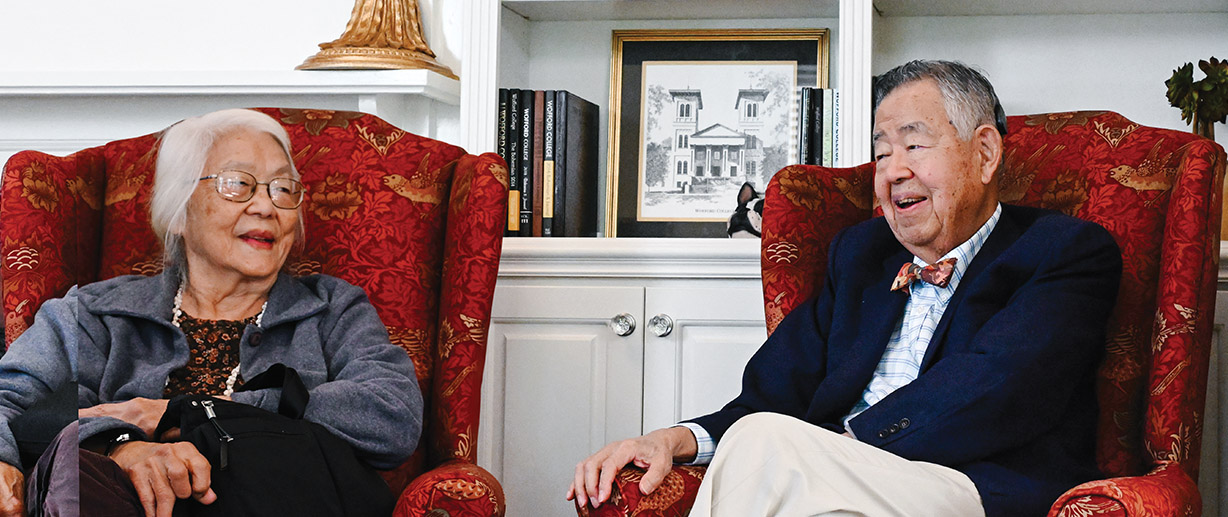By Jo Ann Mitchell Brasington ’89
Dr. Andrew H. Kang ’57 and Dr. Ellen Kang have established an endowed scholarship at the college and are now working toward the establishment of an endowed professorship in biology. These are gifts of gratitude they’ve always wanted to make, and now, in their retirement, with their family well established, they can enjoy what it means to share.
The story of why started long ago.
It was April 1954, less than a year after the end of the Korean War, and Col. Sid Crumpton ’32, a U.S. Army chaplain stationed with the 8th Army Headquarters in Seoul, South Korea, had just finished a large community ecumenical service.
One of the people in line to shake his hand after the service was Andy Kang, a first-year medical student at Seoul National University.
“A friend of mine said let’s go, so we went,” says Kang. “When I thanked Col. Crumpton for the excellent service, he complemented my English and asked me to come to his office later that afternoon.”
Kang agreed.
“The day was very hot, and his office was a tent. It was even hotter inside,” says Kang. “He offered me my first Coke, and I thought it had an odd taste. I didn’t really like it.”
As the conversation progressed, Crumpton asked Kang if he would like to study in the United States. Kang said he would love to but couldn’t afford it.
“What if you were given a full scholarship?” Crumpton replied.
During the Korean War, Kang and his siblings lost their mother, who was killed by North Korean soldiers, and their father, who was captured and never heard from again. Kang sold cigarettes on the streets to help support his siblings until an uncle took them in and began to offer his support and guidance. According to Kang, the chance to leave war-torn Korea and study in the states was almost unbelievable.
Kang arrived on Wofford’s campus a year after that meeting with Crumpton. He was greeted at the airport by Frank Logan, who was the registrar at the time and who, along with his wife, Madeline, became Kang’s American parents.
Although only a month remained of spring semester classes, Kang audited courses and proved to be so proficient that he was allowed to take final exams, gaining credit for the courses. He threw himself into his classes and excelled across the board. He also began to learn more about why he was offered a scholarship to come to Wofford.
“I began to understand why everyone was so pleased with my English, which I considered marginal,” says Kang.
According to Kang, at the end of the Korean War, Wofford was planning to celebrate its centennial. In an act of patriotism and support of the nation’s South Korean allies, Wofford trustees raised the money to establish a scholarship for an international student from the country. Language and cultural barriers proved to be difficult to overcome for the first student to receive that scholarship, so the college asked the local Rotary Club to fund a second scholarship. Kang was offered that second scholarship, but the first student had already returned home before Kang arrived on campus.
When Wofford was not in session, Kang lived with the Logans in what is now the president’s home. He also received support from the Spartanburg community and several families at the Episcopal Church of the Advent, including the family of Dr. George Dean Johnson. They invited him to meals and organized clothing and supply drives to help him in college and later in medical school.
“I have fond memories of Spartanburg, Wofford’s campus, the president’s home and my time with the Logans,” says Kang, who applied for medical school from a desk near the top of the stairs, the same stairs Frank Logan was climbing when Kang told him he wanted to go to medical school at Harvard University.
“The look on his face when I said Harvard left an indelible impression on me,” says Kang. “He was completely taken aback and asked me why. I said, ‘I don’t’ know, but the school is reputed to offer the very best medical education.’ Then Mr. Logan shook his head, nodded, bid me good night and went to bed.”
At Harvard, Kang also excelled and was one of only three Asian students in the program at the time.
While at a Harvard mixer for students from Hawaii, Kang met Dr. Ellen Soo Sun Song, who was an intern at Boston Children’s Hospital Medical Center. They connected as the only two South Koreans at the event and began dating a few weeks later. Kang quickly fell in love.
“The next time I came back to Wofford, I came to tell Mr. Logan that I was in a serious relationship and to seek his advice,” says Kang. “We had a long discussion, and he felt like we should wait before taking the next step. But a young man’s passion is not something that lends itself to rational behavior.”
Just before the wedding, Kang was diagnosed with ankylosing spondylo-arthritis, yet another challenge he found a way to overcome. The experience led him to become one of the world’s foremost experts on connective tissue and rheumatic diseases, eventually retiring as Goodman Professor and Chairman Emeritus of the Department of Medicine at the University of Tennessee Health Science Center in Memphis. At the time of his appointment, he was the first Asian to be appointed to chair any department of internal medicine at any medical school in the United States. In 2001, he was appointed the first director of the Center of Excellence for Diseases of Connective Tissue, which was established by the UT system because of Kang’s expertise. That year he also received the Samsung Ho-Am Prize in Medicine, presented by the Ho-Am Foundation for his contributions to science, and the Middleton Award of the Department of Veteran Affairs. The college conferred upon him an Honorary Doctor of Sciences in 2008.
Now enjoying their retirement, the Kangs have returned to Wofford several times, including for his 50th class reunion. Their daughters — Cynthia, Edith and Audrey — have followed in their footsteps and practice medicine, along with two sons- in-laws and one grandson. The Kangs have a total of six grandchildren and one great-grand child. Kang took his family and re-connected with his siblings in Seoul in 1980.
“Wofford was the saving grace for him,” says Ellen Kang. “The college provided him with a stepping-stone to America and a wonderful life. A college is not just a campus; it’s a people, and Wofford people were very good to him.”
“If not for Wofford College and the Logans, Johnsons, Col. Crumpton and others, I would not be what I am today,” says Andy Kang. “I do believe the whole of my life was arranged by divine intervention.”
Remembering and honoring

Right: Oscar Smith presented inlaid Terrier plaques to many loyal Terriers, including Nayef and Prema Samhat.
When Oscar Smith ’54 retired from the ministry, he continued to minister through his art and wood carvings. Nayef and Prema Samhat, Joe Lesesne and dozens of others have inlaid Terrier plaques that he made. Lisa Harrison De Freitas ’88, associate vice president for philanthropy and engagement, has one of his Christmas ornaments. When Smith died on Sept. 19 in Charlotte, N.C., he left a legacy of good works, and now he will forever be remembered at Wofford College thanks to the establishment of the Oscar and Peggy Smith Endowed Scholarship Fund.
“When dad died, Phyllis (Dyches Smith ’82) and I, along with other members of the family (Steven and Shelly, Michael and Leslie Hintz Smith ’86, William, grandchildren and great-grands) asked mom about ways we could honor dad,” says Dr. Frank Smith ’80, professor of medicine at the University of Cincinnati and senior vice president at Medpace, a specialist in hematology/oncology. “Dad supported many great causes, but we wanted to honor him and mom in a way that would forever be tied to Wofford. Mom loved the idea but said she could never afford that. Phyllis, my brothers, their families and I said we would take care of it. We made her happy at a very difficult time. She said she could think of nothing that dad would love more.”
The Oscar and Peggy Smith Endowed Scholarship Fund will provide scholarships for deserving Wofford students.
“We discussed designating it for ministerial students but decided to leave it open. We trust Wofford to ensure that it goes to a worthy recipient,” says Smith.
After graduation from Wofford, Oscar Smith was ordained a deacon in 1955. He served honorably in the U.S. Army and graduated from the Candler School of Theology at Emory University in 1959.
He served churches in Georgia and South Carolina and as director of the South Carolina Conference Council on Ministries and superintendent for the Columbia District. He retired from the ministry in 1994. Oscar Smith served on the Wofford College Board of Trustees at a time of change and realignment.
“Oscar understood the difference between a college and a church, and he understood that church-related colleges had an important role to play,” says Lesesne, president emeritus. “He never looked for the limelight but didn’t dodge an issue either. He was diplomatic, smart and dealt with things the right way.”
According to Lesesne, Smith, who served from 1980 to 1990, was on a committee to reorganize the board for accreditation purposes, something that would create more continuity on the board.
“For that to happen, someone had to rotate off early, and Oscar took himself off instead of someone else. I asked him why he did that, and he said, ‘Some people will continue to work with the college whether they’re on the board or not. I’m one of them. We’ve got to work this out, and this is how.’ That’s just who he was,” says Lesesne.
For his many acts of service to the college and the South Carolina United Methodist Church, the college conferred an Honorary Doctor of Divinity degree upon Smith in 1995.
“It’s fitting that we honor dad and mom in this way,” says Frank Smith. “Wofford was beloved by him — when he was a student, parent, trustee and season football ticket holder. He came back and gave back to the college every chance he got.”
Memorials may be made to the Oscar and Peggy Smith Endowed Scholarship Fund at Wofford College, Office of Philanthropy + Engagement, 429 N. Church St., Spartanburg, S.C. 29303, or at wofford.edu/give.
